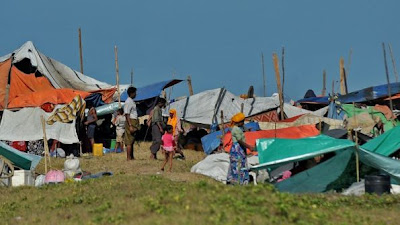 |
| (Photo: AFP) |
May 3, 2013
R.C.
I AM in Malaysia for the election on May 5th, and up here in the north
of the country quite a lot of the political to-and-fro is about
political Islam. The opposition Pan-Malaysian Islamic Party (better
known as PAS) is strong up here in states like Kedah, so the ruling
coalition Barisan Nacional is trying to scare people off voting for them
by claiming that, if they were to be elected nationally, they would
force the opposition coalition into turning Malaysia into an extremist
Muslim state. It’s a lame old tactic, but still seems to find some
traction.
A fellow-member of ASEAN, Myanmar, is wrestling with its own Islamic
problem, but in a much more volatile and blood-soaked manner. This week
saw another nasty outbreak of violence between Burman Buddhists and
Muslims in central Myanmar, this time in a village called Oakka. It was
sparked off by another minor incident, when a young girl apparently
bumped into a monk. This set off a chain events that left one person
dead and nine injured; reports say that Buddhist mobs torched 77 houses
and a couple of mosques.
This follows widespread anti-Muslim riots across central Myanmar in
March that left scores dead and thousands homeless—which in turn
followed blood-lettings in the western state of Rakhine in June and October last year.
What amounted to ethnic cleansing against Rohingya Muslims in Rakhine,
and particularly in its capital, Sittwe, killed hundreds and drove over
100,000 Rohingya to squalid refugee camps outside the city, where they
still forced to live.
The killings in Rakhine, it is clear, inspired a lot of the subsequent
upsurge in general anti-Muslim feeling. So there was much resting on the
outcome of a government-appointed enquiry into the violence in Rakhine,
which finally came out on April 29th. Yet in the end the long-delayed
report was pretty much a cop-out. It makes no concessions to Rohingya
sentiment and few concrete suggestions that could help the situation
there. Some diplomats and UN officials were looking to it for evidence
that the reforming state of Myanmar is genuinely prepared to tackle the
fundamental issues of race and religion that have destabilised the
country since it won its independence from Britain in 1948—but there
were no signs of that in this report.
For a start, the unfortunate Rohingyas are referred to throughout the
report as “Bengalis”, the derogatory term employed by their enemies to
delegitimise their claims to being included as a people rightfully
living in Myanmar. “Bengalis” conveys the clear meaning that the
Rohingya belong in Bengal (or East Bengal; now Bangladesh) and not in
Myanmar. Notch up a victory there to the rioting mobs of Rakhine—they
will be very happy about that.
Some others were hoping that this big concession to the anti-Rohingya
contingent would be balanced by a commitment from the commission to
start giving the Rohingyas some status as citizens, perhaps leading
eventually to their full citizenship. The root cause of the Rohingyas’
problems is that under Myanmar’s discriminatory and archaic 1982 Citizenship Act
they are denied any form of citizenship, and thus any protection or
help from the state. Yet the commission says only that the government
should “examine” the citizenship status of people in Rakhine state.
That’s an open-ended invitation to the government to do nothing.
No Rohingyas were invited to sit on the 27-man commission, and the bias
in favour of the ethnic Rakhine shows throughout. One particularly
sinister recommendation, easily open to abuse, is that the Rohingyas be
given “family-planning education”. It’s a loud complaint of the Rakhine
that their Muslim neighbours “breed too much” (as it was often put to me
in Sittwe), and this clearly panders to that prejudice. But as must be
very evident from history it’s dangerous to start advocating birth
control for just one ethnic group. What sort of message will that send
out to the mobs?
Just as worryingly, the report also recommends that the present
separation of Rohingya Muslims from the ethnically-cleansed Sittwe and
other Rakhine-majority centres be continued, temporarily—on grounds of
safety. Again, not very helpful; that more or less justifies the present
state of segregation without suggesting any path back to the two
communities’ reintegration. Again, pretty much exactly what the more
bigoted Rakhine will have wanted to hear.
In practice, unless action is taken now, the “temporary” segregation
will slip almost inevitably into a “permanent” segregation—as has
happened in almost all similar recent cases around the world, for
instance in Sudan’s Darfur region. And the problem of what to do with
the hundreds of thousands of Rohingyas, now cooped up in their tents and
canvas shelters, will only worsen. With the monsoon fast approaching,
there are growing fears for the health and safety of the internees. All
in all, not a good week for reforming Myanmar, and a pretty disastrous
one for the country’s Muslim minority.

No comments:
Post a Comment